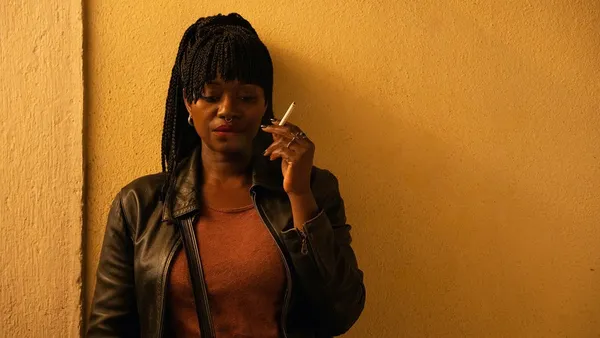 |
| Babetida Sadjo in Our Father, The Devil |
Featuring one of the most powerful central performances of the past year, Ellie Foumbi’s Our Father, The Devil (aka Mon Père, Le Diable), which is screening at the 2023 Glasgow Film Festival, is the story of a refugee whose quiet life working in a care home in France is thrown into chaos by the unexpected arrival of a man who may have ties to her past. Babetida Sadjo shines as Marie, a woman struggling under the weight of awful secrets, while Souleymane Sy Savane plays Father Patrick, the priest who, one way or another, holds the key to her future.
Having fallen in love with the film when I first saw it, I was delighted to have the chance to chat to Ellie. I told her that I always find it strange the way that people expect refugees who have been through awful things to just be magically okay once they reach somewhere safe, and she agrees. Was that one of the starting points for the film?
“I feel that it might not have been a starting point, but it very quickly became an important point,” she says. “Something that for me, as an immigrant, and for a lot of people that I know who are not okay, you know, it's hard enough when you're trying to assimilate, you're trying to adjust to a new country, to a new language, to a new culture. There's so much that you have to like sort of shove under the rug in order to deal with that part of your new life. And also, depending on where you're living, but I think every Western nation has some version of this, not wanting to be seen as a problem, not wanting to be seen as a bad apple, from the people who are accepting you into their country. Wanting to be a model example of your culture.
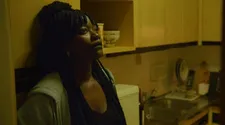 |
| Babetida Sadjo in Our Father, The Devil |
“Unfortunately, that means that you're not always given the opportunity or the luxury to be able to say, ‘Hey, I'm not okay, I have a problem. I'm dealing with these things that happened.’ I think that that's, unfortunately, the burden that a lot of immigrants must carry, even if it's shown in this very extreme case. I think it's very true of a lot of people that I met, actually, especially in the UK. When we screened it in London, there were quite a few refugees, children of refugees, people who were so moved, and who were also coming to terms with what their parents might have dealt with, and how their parents had to toughen up in order to make their lives in the new country possible.”
It seems to me to be ironic, because she works in a care home herself. Obviously that's a very commonplace profession for people when they emigrate to a new country, but I wondered if some of she's also doing that because if she's focused on caring for other people, she can ignore her own problems.
“Absolutely. That was definitely one of the reasons I chose that profession for her, because it fits her desire to push everything under the rug and not have to deal with her own trauma, but also I think, given the level of shame and the level of guilt that she's carrying, it allows her to feel like she's doing some good, that she's giving back in some way.”
So how did the film first develop?
“It developed because of my dad's work in Rwanda. I became really curious about what he was doing. It was 2000s, it was maybe a decade or so after the genocide, and he was working on building a national forgiveness programme with the First Lady. I just was very sceptical of how that was going to work, and how half the country was going to forgive the other half for the atrocities that had been committed. I thought, you know, there's a limit to what people can forgive. I was very young, but this was my thinking.
“He introduced me to a woman who was running an NGO and she was working on helping people who had been orphaned through the genocide. And I got to talk to one of them, too, actually – one in particular. Him sharing his story with me, him talking to me about his difficulties leading a normal life, the rage that he carried with him into his late twenties and the fact that he thought of nothing but taking revenge on the people who killed his family, that really stayed with me. I was heartbroken because I thought, ‘Well, he's been robbed twice now.’ He's been robbed because obviously he's lost his entire family, but now his whole life is is also shattered. How was he going to pull it pull himself together? How was he going to try to have some kind of a life?
“I became really interested in the recovery stage, and how – if – it's possible to piece your life back together after war, after losing parents, after going through atrocities. At the same time as I was curious about his recovery, I was curious about the perpetrators. And so I started looking again at child soldiers and reading up on different countries, not just in Africa but even in Europe. I read the statistics, which were pretty bad. The suicide rate is very high. And I thought,’ I haven't seen a story told from the perspective of someone who's on the other side of this.’
“Most of the films are about the conflict about how the kids are particularly, you know, films that deal with civil war in Africa, it's usually about how kids are recruited and what happened during the war. But we don't know what happens to these kids. Who do they grew up to be? Are they able to get help and put this behind them? Are they able to have normal lives in the end? Because I didn't see any films on that. I thought, well, this is a really important, this is something that I care about. And I wanted to tell it from the perspective of a woman, and it sort of evolved from there.”
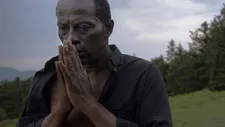 |
| Souleymane Sy Savane in Our Father, The Devil |
It's interesting, I venture, because when we do see films about child soldiers, we tend to see them while they're still children, and it's maybe easier to think of them as innocent then. But they do become adults, and then, even if they did what they did when they were children, there's more of a feeling that they're guilty of something because they're adult now.
“Absolutely. And that's something that I thought was more interesting to explore, that issue of guilt and whether someone deserves to be forgiven, you know? I think because you're exploring things that were done when they were so young, it's harder to grasp that, and for me that made it a better subject, more interesting and less black and white.”
How did she go about casting these complicated roles?
“I had nightmares about it,” she says, “but I was really lucky. We’ll start with Babetida, because I actually saw her first I. We have a mutual friend who's also an actor who was cast in a film with her. This was a film in 2014, called Waste Land. I saw a trailer for the film. There's a little micro scene that she's in and just her eyes and her face – I just was so transfixed by her, I felt like, ‘I don't know this woman but I know that I want to work with her.’ Even though I hadn't even started having the idea for Our Father at that point, her face was in my mind.
“Then I worked with Souleymane, who plays Father Patrick, on a short. We were both cast in a short and we got to know each other and I was a fan of his work. He was in a wonderful film by Ramin Bahrani called Goodbye Solo, that had gotten a lot of attention, so I knew who he was. And I thought, ‘He's such a talented actor, I'm surprised he's not working more.’ And through our friendship, I wanted to create a vehicle for him, to give him the opportunity to show his range. And so I started developing the role of Father Patrick specifically for him. So he was on board from the beginning.
“Then it was a question of getting Babatida on board because I didn't know her. I reached out to my friend and asked if he could connect us, and that's how I was able to get her a treatment. We talked via Zoom because this was right before the pandemic and she lives in Brussels. I live in New York. So there's the distance that also makes it a little bit tricky, but we had a Zoom call and it was just magical. I knew she was right from the moment we started speaking.”
I tell her that I'm interested in the way that Babetida is introduced in the film, because in the opening sequence we see her from behind, and we see parts of her body, but we don't see her face for a while. Was that about exploring the distance which she tries to create from the world, and making things impersonal?
Ellie nods. “It was certainly about the distance, but also about the mystery around her character around not really knowing who she is. And for me, in that opening shot, the reflection hints at her double personality, the two sides of her – the one that she presents to the world and the real side that she's hiding underneath.”
How did they work together to develop that performance?
“Oh my gosh. I mean, she's so wonderful. It was unfortunate for the rest of the world, but for us, it was a blessing to have the pandemic. We had a lot of time via Zoom to talk about the character. What was really key for us was digging into Marie's past, digging into exactly who she was, really fine tuning the details of her life right through to her recruitment.
“What was kind of nerve racking for me was the fact that because of the pandemic, I didn't get to meet her in person until we started shooting, so that was very stressful. But we had a couple of days of rehearsal before we started. It was great to be able to see her and Father Patrick and the other actors just be in the same room and to know that the chemistry was right, and they were going to do a great, great job.”
Something that I find interesting about her character, which is common for a lot of trauma survivors but rarely depicted onscreen, is that while we worry that she's in danger, she's at least as worried about losing control of her own behaviour and responding violently, rather than simply being victimised.
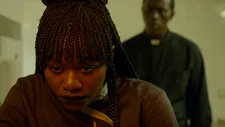 |
| Babetida Sadjo and Souleymane Sy Savane in Our Father, The Devil |
She smiles. “You're picking up on things that no one else picks up. It's absolutely true. I did so much research on trauma survivors, rape victims, and I read a lot about child soldiers. I don't know, it was something of a combination of that and understanding, psychologically, what's happening, and me putting myself in her shoes. Because I'm also an actor, and so I write from that place of I'm walking in my character's footsteps, and I'm feeling the anxiety. As I was writing it, I could feel my palms getting sweaty. And literally, the first thought that I had was, ‘Oh, my God, I'm going to kill this guy. If I don't get out of here, something bad is going to happen. Also because no one knows who she really is. No one knows what she's done. So there's a real fear of something bad happening, of her being found out, you know? And so I think her first instinct is to try to leave, but that doesn't work out.”
For a lot of the film, it really feels as if there's only one way that things can go, but there’s still a constant effort to open up different possibilities and suggest different directions, even though Marie can't really see those things herself.
“I do think that it was important to show that there were other possibilities because you as an audience member want her to make the right choice,” Ellie says. “I was always leaving that door open for her to make the right choice. But unfortunately, because of the severity of the trauma, once she's got one door closed she cannot...” She pauses. “You know, if she would have been able to take a vacation, maybe – I don't know. Maybe it happens when she gets back. But I think even just her having that moment of reflection, and then figuring out how to deal with him being there, might have been helpful. But because she isn't afforded that, there's really only fight or flight. She doesn't know what his intentions are, so she's on guard.
“I feel like from that point on, there are so many opportunities for her to make a different choice, and I wanted the audience to root for her to do that. But of course, I'm taking them in a very different direction. For me, that kind of push and pull is part of what creates this really dynamic narrative. You don't want her to go down this this road. But I think it's interesting that audience reactions and feedbacks have been varied.
“At the beginning, you know, there's a bit of the audience that's with her and very much wants for her to avenge whatever happened, even though they're not quite sure what that is yet. And at some point that turns, because there’s sympathy for Father Patrick, and really, I'm forcing you to see him as a human being. Regardless of what he's done in his past, he is still a human being. And I do think that there's a moment where the audience, it becomes harder for them to stay on board with her torturing him. Some people were with her right up until the end, and whatever that says about them is interesting, but I think that's also something I wanted to explore, and challenge the audience and challenge what their view of a hero is.
“What I'm interrogating is this question of ‘Do people deserve a second chance?’ I'm giving that as a challenge to the audience to really seek their own hearts and see how they feel about it. And I think that this allowed me to do that in a way that had she not had all those options, the audience would not have reflected on it the same way.”
So did she expect the kind of attention that the film has had from festivals?
“No, it's been a huge surprise. I mean, we made this as a very small film. Obviously, it premiered in Venice, but, you know, in a non-competitive section, so I wasn't expecting anything. I just was hoping we could sell the movie and move on with my life. I was really just seeing this as a stepping stone to the next project. But I will say it's been quite a ride and quite a surprise, and I've been really moved.
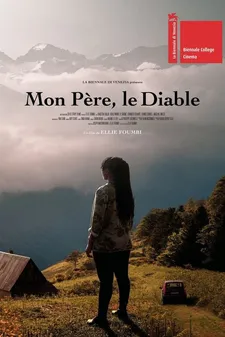 |
| Our Father, The Devil poster |
“I am really interested in making films that I feel make the world a better place. It's not always going to be a pretty journey, it's not always going to be an easy an easy proposition, but I really did make this film from a place of wanting to do good and wanting to give hope to people. I think that's the part that touches me the most. That the film has found this audience on the circuit and that it's attracted all this attention, that's just like a huge cherry on top.”
She’s currently at work adapting a project by a best selling author, she says, and she’s also working on a western.
“It’s called Raw Sun and it’s a modern western, about an immigrant again, who is working for a family in Texas and ends up being accused of murdering the husband of the couple that she's working for, and going on the run. I really want to continue to tell human stories, mostly from the perspective of women of colour, although this film is an ensemble movie, so it does give different perspectives, not just from the woman of colour but from a white family that she is living and working for, which I love. It's allowing me to stretch myself and I love westerns, and so just the thought of making this film makes me very happy.
“And then I have a third. It's a story about a Black woman who was adopted into a Mennonite community, and she ends up leaving that community when she learns that she's pregnant, in order to go find her biological mother. She's really torn about becoming a mother because she doesn't really have any connection to her own biological mother or to what being a mother is, and so it's an interrogation on race, on community, on religion and the intersection of those three things. And I've decided to turn that into a mini series.”
Our Father, The Devil screens at the Glasgow Film festival on 10 and 11 March.
























